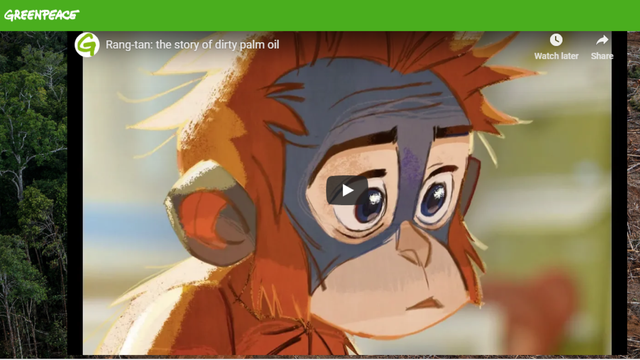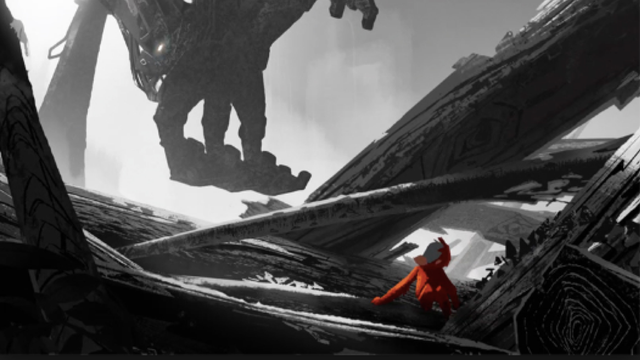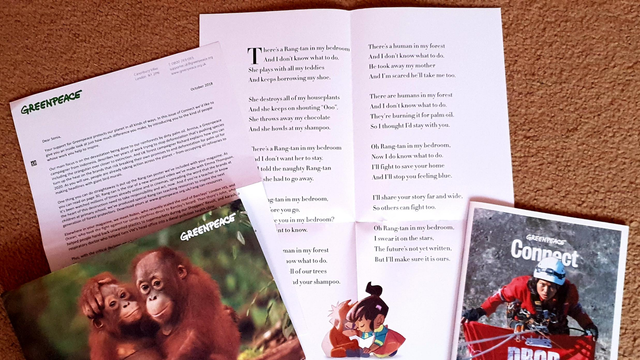Greenpeace UK: Rang-tan and the story of dirty palm oil
- Exhibited by
- Sonia Triki
- Added
- May 09, 2019
- Medium of Communication
- Television
- Target Audience
- Individuals
- Type of Charity
- Environmental
- Country of Origin
- UK
- Date of first appearance
- 2018
SOFII’s view
This television (TV) advert by Greenpeace outlined the destructive reality of the palm oil industry and how it is found in many things, from food to toiletries.
The story of Rang-tan played a huge part in raising awareness in the UK, becoming a conversation piece and a rallying cry that was picked up by donors, campaigners and even businesses.
Summary / objectives
This animated film was created to raise public awareness of the huge damages created by the palm oil industry. People were encouraged to sign a petition to call out household brands (Colgate-Palmolive, General Mills, Hershey, Kellogg’s, Kraft Heinz, L’Oreal, Mars, Mondelez, Nestlé, PepsiCo, Reckitt Benckiser and Unilever) to use more environmentally-friendly sourced palm oil and stop deforestation.
Special characteristics
The animated film was narrated by Oscar and Bafta winning actress Dame Emma Thompson.
Influence / impact
The film and the petition had a massive success, viewed by millions of individuals in the UK and abroad. It attracted the attention of supporters including celebrities (from One Direction’s Liam Payne to Stephen Fry) and commercial brands.
Iceland UK offered to remove Greenpeace branding and use the Rang-tan film for their Christmas TV advert. ClearCast (the non-governmental organisation which pre-approves most British television advertising) refused to allow this on the ground that they were ‘concerned that it doesn’t comply with the political rules of the BCAP (British Committee of Advertising Practice) Code and that the creative submitted to us is linked to another organisation who have not yet been able to demonstrate compliance in this area’.
The decision created even more engagement with the public who massively supported the campaign providing Greenpeace with even more press coverage and making everyone forget about John Lewis and any other brand’s Christmas adverts.
As of February 2019, the online petition had been signed by 1.2 million people in the UK alone. The supporter journey then took people to a fundraising page which given the success of the petition, the media attention and the celebrity involvement certainly translated into new campaigners and financial supporters.
Results
The Greenpeace Rang-tan campaign took the country by storm. It became the Christmas campaign of 2018, taking over bigger commercial brands with bigger budgets and an established presence on television.
By early December, the film reached more than 65 million views. The petition was signed by 1.2 million people in the UK: even if only one per cent converted to become a regular donor, it would still represent an estimated 12,000 new donors acquired without any other channels than social media and word of mouth.
The Rang-tan campaign also benefited from massive press coverage, from specialised titles to more mainstream publications, and significant engagement on social media, with people of all generations sharing the video and (re)tweeting the petition.
Moreover, Greenpeace managed to tap into social conversation and words such as ‘palm oil’ and ‘environment-friendly’ were discussed in conversations between people who may never have discussed or considered sustainability before.
In terms of the organisation’s mission and engagement this campaign is an absolute success. It made large numbers of people in the UK care for or at least reflect on the impact of their choices and behaviours as consumers, how and where their products are sourced and whether or not it is fair to the environment.
It also reshaped Greenpeace’s image in some ways, turning them from a strong and bold movement known for their radical activism into a softer and more accessible organisation.
Merits
This is exactly what ‘brand engagement’ should look like. And it evidences that, with the right message and execution, even not for profit organisations can compete with and outshine commercial brands. Greenpeace took a chance on one fabulously executed film, where the celebrity ambassador only narrates and is never shown or referred to.
This film and the supporter experience altogether created an inspiring experience and built an even bigger community around the messaging. But the best accomplishment of all is how this campaign broke into social conversation, making the cause matter so much that it became mainstream. This is, or should be, the purpose of all charities.
Other relevant information
However, the Rang-tan film was also subject to some controversy.
According to the Greenpeace UK website:
‘Rang-tan was blocked from being shown on TV in the UK. It all started when supermarket chain Iceland decided to use Rang-tan as their 2018 Christmas advert. Their aim was to help spread the word about destructive palm oil. However, it was rejected by Clearcast, the body that approves TV ads in the UK, because of Greenpeace’s ‘political aims’. This decision provoked a storm of controversy, and the resulting publicity helped the film reach more than 30 million online views.’
Not long after, there was a sequel to Rang-tan. It was called ’Monster’ and featured a little boy who finds a jaguar in his kitchen.
You can find out more about the second film and the controversy surrounding the Iceland advert, on Greenpeace’s website, here.



Also in Categories
-
- Campaigning for social change
- Broadcast

















